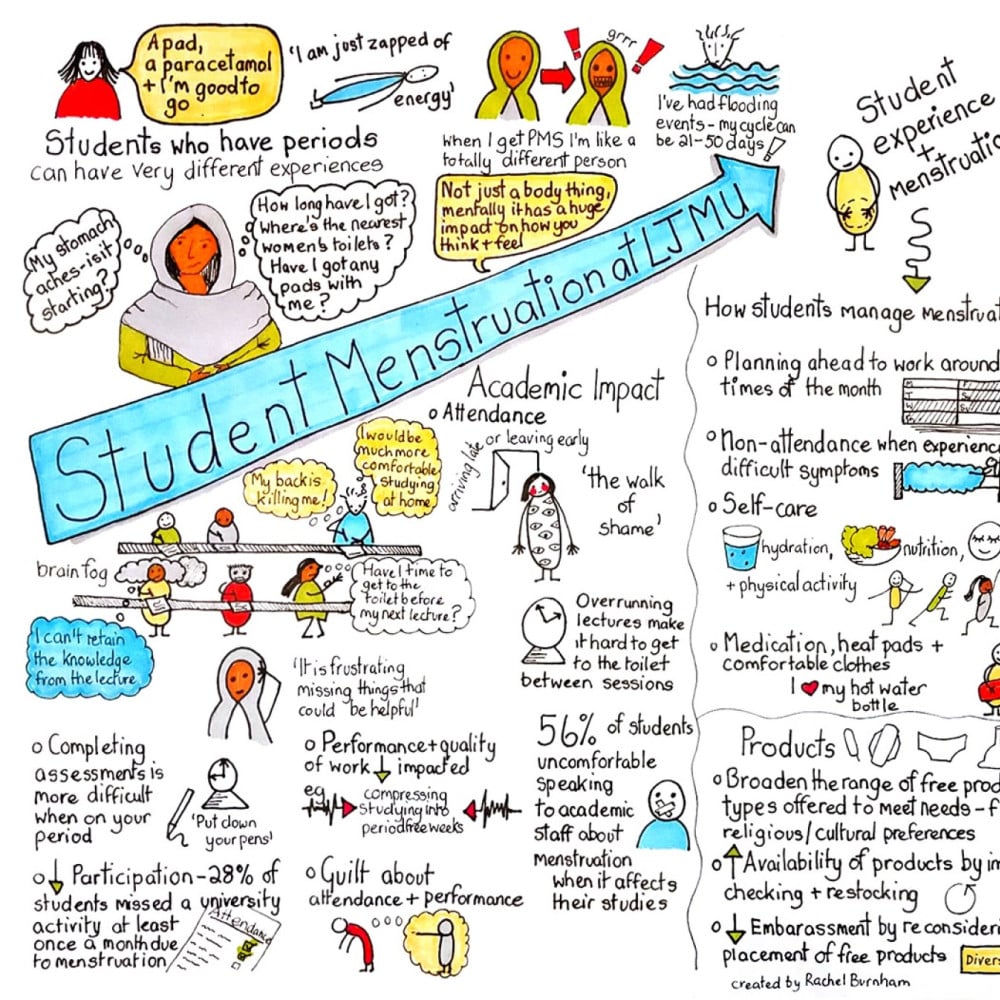
Chartered ABS statement on the international student levy
Chartered ABS response to the Government's announcement that it will fund maintenance grants through the new international student levy.
- Home
- / Policy
- / Research and Funding
- / Menstruation matters for students in higher education
Menstruation matters for students in higher education

Authors

Dr Gemma Dale CMBE
Senior Lecturer, Liverpool Business School

Dr Katherine Neary
Senior Lecturer, Liverpool John Moores University
Research conducted by a team from Liverpool Business School at Liverpool John Moores University, suggests more can be done to support menstruating students to ensure they can achieve academic success and fully participate in university life.
At Liverpool John Moores University, we wanted to explore students' experiences of menstruation and examine how it influences their attendance, participation, and overall wellbeing when on campus. Working in partnership with three student co-researchers, we used a combination of an online survey and semi-structured interviews to collect data from current students across the university. We identified not only the ways in which menstruation impacts students but also suggestions for fostering a more inclusive and supportive approach to menstruation within higher education.
Previous research has established that menstruation can affect student attendance and this is also true of our students, who told us that sometimes their menstrual symptoms prevent them from attending university or participating in wider university life. Also in line with previous research, our students engage in presenteeism when they are menstruating – they attend class but find it difficult to engage, concentrate and also find it difficult to retain information. They sometimes rely on lecture notes or recordings to catch up afterwards, and some will plan completion of work around their menstruation to ensure they maintain pace. This can cause additional pressure and feelings of stress when seeking to balance all aspects of their lives.
The impact of menstruation on students
Our students told us that menstruation has a negative impact on their ability to fully participate academically and in extracurricular university life. 28% of students said that they missed a university activity at least once a month because of menstruation. Students are also concerned that menstruation affects their academic performance in assessments and group work, and they fear letting down other students. Time-bound assessments that coincide with menstruation can leave students feeling like they did not get the grades that they believe they could be capable of at other times of the month.
Students make decisions about how best to manage their menstruation. Sometimes this means staying at home because they just can’t comfortably manage their symptoms during the study day. Being on campus and the structure of the university day influences how students manage their menstruation and those choices about turning up. Back-to-back classes leave little time for managing menstrual hygiene, students reported making decisions on if to use toilet facilities or take time for lunch. Large lecture theatres are often not conducive to leaving to use the toilet, so students will simply opt out of attending them to avoid potential embarrassment and unwanted ‘walk of shame’.
For some students, the experience of menstruation brings additional complexities. This may be related to culture, religion, gender identity and associated medical conditions. Menstruation is different for everyone, meaning that an individual approach might be required in order to effectively support students, especially those who have particularly problematic menstruation.
From our survey, one important statistic stood out. 56% of students said that they would be uncomfortable or very uncomfortable speaking to academic staff about any menstruation related issues that are affecting their studies. However, conversely, when students did talk to teaching staff, they reported receiving positive responses – but many of them simply can’t or won’t.
Whilst none of our students expressly used the term ‘stigma’ their descriptions of feelings around menstruation at university suggest that some experience embarrassment and even shame. ‘I've had to get up and leave while the lecturer is still talking. And that's embarrassing because there's 180 kids in my year and you're having to do the walk of shame out of the lecture theatre.’ Students do not necessarily feel that menstrual difficulties will be taken seriously or that menstruation is a ‘good enough’ reason to seek support or flexibility. They also describe taking steps to conceal their menstruation from others whilst on campus. Others find mixed sex toilets awkward when menstruating or find it difficult to openly take provided sanitary products where these are provided.
Finally, students shared the impact that menstruation has on their emotional and mental health: ‘It is not just a bodily thing, mentally it has a huge impact on the way you think and how you feel.’ Stress and anxiety can arise as a symptom of menstruation, but also as a result of managing menstruation around their studies and attendance on campus.
How we can support students who menstruate
Whilst in recent years it has become common for universities to take steps to address period poverty and provide free period products, our research suggests that there is more that universities can do to promote inclusion in relation to menstruation. Students told us that there are four key steps that will make a difference to them:
Improve menstrual literacy amongst students and staff. Creating dialogue and increasing awareness and understanding of menstruation can provide useful, practical information to students on managing their menstruation, and help staff to make appropriate adjustments and take an empathetic approach.
To tackle period poverty, provide a broad range of easily accessible period products to meet a range of menstrual needs, with careful thought to placement of these products so that students can be comfortable taking and using them.
Explore policy options, especially in relation to teaching, learning and assessment. Menstruation can be considered a recognised rationale for flexibility and extensions, following similar approaches to how students with disabilities are supported.
The provision of additional support for menstruating students such as visible information campaigns and student groups to bring together those with common experiences.
57% of undergraduate students are female and may therefore be regularly menstruating. Our research suggests that more could be done to support them to ensure that they can achieve academic success and fully participate in every aspect of university life. Doing so will require cross departmental collaboration, with professional services and academic staff working together to address the practical, educational and wellbeing-related challenges menstruating students may face. These steps can help to ensure inclusion and academic success for all students who menstruate.
References:
Break the Barriers: our Menstrual Manifesto | Plan International UK
Higher education in facts and figures: 2023 | Universities UK
Sketch note designed by the Liverpool John Moores University research team:

